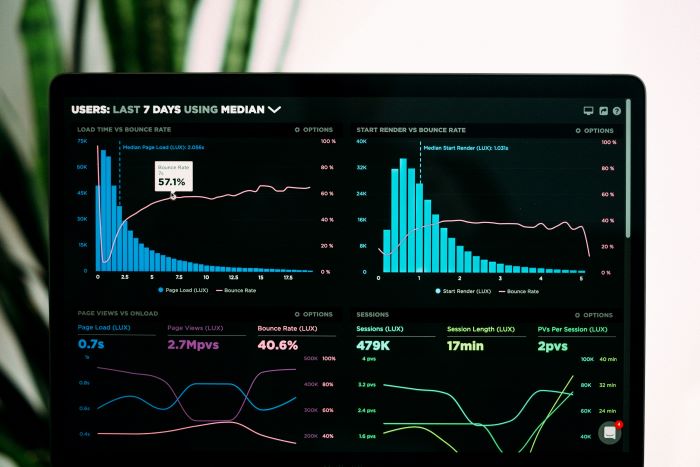A web analyst is a specialist who analyzes data collected from user activity on the Internet. Their tasks include collecting, analyzing, and interpreting data to support business decisions. In the article, we will discuss who a web analyst is, how they differ from a data analyst, and what tasks and skills are crucial for this role.
Key information
- Web analyst collects and interprets data regarding websites and web platforms, which supports making accurate business decisions and optimizing marketing efforts.
- Key skills of a web analyst include knowledge of programming languages, visualization tools, and communication skills that allow them to cooperate effectively in a team.
- The profession of a web analyst is dynamically developing and brings many benefits that increase the significance of data in business decision-making.
Web analyst — who is it, and what are their responsibilities?

A web analyst is a specialist who collects, analyzes, and interprets data based on user interaction on the Internet. Their role in an organization is crucial because it supports decision-making by translating the collected data into understandable information. Thanks to that, decision-makers can better understand customer behavior and optimize marketing activities.
The main tasks of a web analyst include collecting data, creating reports, and analyzing and monitoring user behavior. They work with technical and marketing teams, allowing an organization to optimize websites and improve user satisfaction. Their work directly influences the development of marketing strategies by providing valuable information from the data analysis.
The web analyst pays attention to metrics such as:
- Number of website views
- Number of new users
- Sources of website traffic
- Bounce rate
- Conversion rate
- Number of post views on social media
Moreover, the web analyst indicates beneficial steps the company can take and evaluates the consequences of decisions. Therefore, the job of the web analyst is complex and requires technical skills as well as the ability to cooperate with different departments.
Data analyst vs. Web analyst
A data analyst is responsible for analyzing data from various sources regarding various business sectors. This data can include sales, marketing, production, or finance. In other words, a data analyst analyzes all data that influence the efficiency of the entire business.
In turn, the web analyst focuses on analyzing websites, e-commerce platforms, or social media sites. Their main goal is to improve metrics related to them.
Web analysts help improve user experience, conversion rate, and bounce rate, among other things. They also interpret quantitative data such as product reviews, comments, and opinions on social media.
Web analyst: key skills

To be successful as a web analyst, you need to have a wide range of skills. Web analysts working on website analysis should know how to interpret data about Internet traffic (organic traffic vs. direct traffic), identify traffic patterns on the site, and cooperate with marketing and development teams to optimize website operation effectively.
Besides technical skills, web analysts should also know how to communicate productively. The ability to create clear reports and result presentations is crucial for effective communication within the team. The web analyst needs to know how to talk with people from various departments, such as business, marketing, and IT. This allows them to improve teamwork and achieve common goals.
Web analysts can but don’t have to be proficient in programming languages. Knowledge of data visualization tools such as Tableau and Power BI is also helpful because they allow them to create interactive reports and analyses.
Experience in marketing, SEO, and marketing automation is also significant for working effectively and efficiently as a web analyst.
Tools for web analysts

Web analysts use various tools to collect, process, and analyze data, allowing them to better understand user behavior and optimize websites. Knowledge of analytical tools and the ability to use statistical techniques are essential for web analysts' work. Thanks to them, analysts can successfully collect, analyze, and interpret data regarding user behavior.
One of the essential tools used by web analysts is Google Analytics. This popular tool enables analysts to track user activity on a site and collect information about their behaviors. Google Tag Manager is another tool that allows them to manage tags on websites, which facilitates collecting data and tracking users without modifying the website’s code.
Apart from Google Analytics and Google Tag Manager, web analysts also use different tools, such as SQL, to manage data in databases and data visualization software, such as Looker or Klipfolio. The repertoire of web analyst tools also includes programming languages such as R and Python that offer various libraries for data analysis and visualization.
Google Analytics
Google Analytics is one of the most popular tools for data analysis. It tracks user activity on a website and collects information about their behavior. This tool allows analysts to monitor website traffic and understand how users use the site in real-time.
One of Google Analytics's most important features is the ability to define goals. This allows analysts to track conversion rates and evaluate the effectiveness of marketing efforts. With that, e-commerce analysts can accurately monitor which campaigns bring the best results and which website elements should be optimized.
Google Analytics also provides detailed information about how users interact with a site, which allows organizations to make informed business decisions. This tool is invaluable to web analysts because it enables them to analyze data in an accessible and understandable way.
Google Tag Manager
Google Tag Manager is a tool that allows analysts to manage tags on websites. This makes it easier to collect data and track users without modifying the website’s code. Thanks to this tool, web analysts can quickly and easily add or update analytical scripts, which speeds up the process of making changes to the website.
Google Tag Manager makes it easier to manage tracking scripts without involving programmers. This tool is an immense help for the web analyst because it allows them to continuously track user interaction and react quickly to changing business needs.
Other analytical tools
Web analysts use other tools for conducting data analyses besides Google Analytics and Google Tag Manager. SQL is a crucial language used to manage and manipulate databases, allowing analysts to analyze huge datasets effectively. Other programming languages that support data analysis are R and Python.
Tools for data visualization, such as Tableau and Power BI, enable analysts to present data graphically and interactively, making it easier to interpret analysis results. Looker supports integration with various databases, and Klipfolio offers the ability to adapt the administrative panel to the organization's needs.
How to become a web analyst?

The path to becoming a web analyst can start with core courses and postgraduate studies that teach you about data analysis and tools. Gaining practical experience is crucial, which you can achieve by working directly on projects.
It’s also worth gaining skills in project management, which are significant for the web analyst career. The basics are enough to start working as a web analyst, and further competencies can be developed during the work. Analysts have to be flexible and willing to continuously develop their skills.
Practical knowledge and skills in data analysis are essential to become a great web analyst. Knowledge of analytical tools and the ability to identify trends and extract crucial information are vital elements of the analyst’s work.
Benefits of working as a web analyst

Working as a web analyst has many benefits. A web analyst collects and interprets data about user interactions on a website, which supports marketing activities and product development. Thanks to them, companies can make better business decisions based on data instead of intuition.
The web analyst is an advisor who delivers data that can lead to better decisions. Thanks to their work, web analysts help optimize conversion rates, which is key to success in industries such as e-commerce.
The profession of a web analyst is increasingly in demand because companies realize the need for data analysis. Studies related to data analytics often result in international certifications that give candidates an advantage in the job market.
Challenges waiting for web analysts
Web analysts often face huge amounts of data, making drawing helpful conclusions and identifying trends challenging. The increase in the amount of generated data by 2025 is estimated at 175 zettabytes (according to IDC report), which will significantly increase demand for data analysts.
New technologies in data analytics, such as artificial intelligence and machine learning, pose additional challenges related to their implementation and optimization. Using natural language processing (NLP) for interactions with analytical systems will make it easier for analysts to access analyses and data.
Strict data protection regulations like GDPR increase web analysts’ responsibility to manage and protect personal data. Analysts need to stay up to date with regulations to effectively manage data and protect users' privacy.
The future of web analysts
Web analytics is a promising field with many development possibilities ahead of it. The profession of a web analyst has been around for a relatively short time, emphasizing its dynamic development. More and more companies are realizing the need for data analysis and its benefits, which raises the importance of this profession in the business world.
The profession of web analyst evolves with the development of technology and the growing importance of data in business decision-making. The future of web analytics is promising, and experts in this field will play an increasingly important role in companies worldwide.
Summary
The web analyst profession is fascinating and vital in the modern business world. To effectively conduct data analyses and translate them into concrete business activities, web analysts need a wide range of skills, from technical to communication. Tools such as Google Analytics, Google Tag Manager, SQL, Tableau, and Power BI are crucial for the analyst’s daily work. They allow them to collect, process, and visualize data.
Challenges waiting for web analysts, like huge amounts of data, new technologies, and data protection regulations, make this profession demanding and full of possibilities. The future of web analytics looks promising due to the increasing significance of data for making business decisions. Are you ready to take up the challenge and become an expert in data analytics?
Frequently asked questions
Who is a web analyst?
A web analyst has a crucial role in collecting and interpreting data regarding Internet users. They support making accurate business decisions. Becoming a web analyst is a great path for people who want to have a tangible impact on marketing strategies and the company's development.
What key skills does a web analyst need to have?
Key skills for web analysts include knowledge of SQL, Python, and R, the ability to use data visualization tools, and communication competencies. Invest in the development of these skills to stand out in the job market.
What tools are most commonly used by web analysts?
The most important tools for web analysts are Google Analytics, Google Tag Manager, Tableau, and Power BI. Use them to analyze and visualize data effectively.
What are the benefits of working as a web analyst?
As a web analyst, you can influence business decisions and optimize results. Moreover, you can gain valuable certificates and become part of a dynamically developing industry.
What challenges are waiting for web analysts?
Web analysts face huge amounts of data and also have to implement new technologies effectively and protect personal data. By overcoming these challenges, they can achieve significant success.





